- Home
- Brandon Sanderson
Edgedancer Page 7
Edgedancer Read online
Page 7
“Did you know we were considering bonding this nice cobbler man instead of you? A very kindly man who took care of children. I could have lived quietly, helping him, making shoes. I could have done an entire display of shoes!”
“And the danger that is coming,” Lift said. “From the west? If there really is a war?”
“Shoes are important to war,” Wyndle said, spitting out a splatter of vines on the wall about him—she wasn’t sure what that was supposed to mean. “You think the Radiants are going to fight barefoot? We could have made them shoes, that nice old cobbler and me. Wonderful shoes.”
“Sounds boring.”
He groaned. “You are going to slam me into people, aren’t you? I’m going to be a weapon.”
“What nonsense are you talking about, Voidbringer?”
“I suppose I need to get you to say the Words, don’t I? That’s my job? Oh, this is miserable.”
He often said things like this. You probably had to be messed-up in the brain to be a Voidbringer, so she didn’t hold it against him. Instead, she dug in her pocket and brought out a little book. She held it up, flipping through the pages.
“What’s that?” Wyndle asked.
“I pinched it from that guard post,” she said. “Thought I might be able to sell it or something.”
“Let me see that,” Wyndle said. He grew down the side of the wall, then up around her leg, twisted around her body, and finally along her arm onto the book. It tickled, the way his main vine shot out tiny creepers that stuck to her skin to keep it in place.
On the page, he spread out other little vines, completely growing over the book and between its pages. “Hmmm…”
Lift leaned back against the wall of the slot as he worked. She didn’t feel like she was in a city, she felt like she was in a … tunnel that led to one. Sure, the sky was open and bright overhead, but this street felt so isolated. Usually in a city you could see ripples of buildings, towering off away from you. You could hear shouts from several streets over.
Even clogged with people—more people than seemed reasonable—this street felt isolated. A strange little cremling crawled up the wall beside her. Smaller than most, it was black, with a thin carapace and a strip of fuzzy brown on its back that seemed spongy. Cremlings were strange in Tashikk, and they only got stranger the farther west you went. Closer to the mountains, some of the cremlings could even fly.
“Hmm, yes,” Wyndle said. “Mistress, this book is likely worthless. It’s only a logbook of times the guards have been on duty. The captain, for example, records when she leaves each day—ten on the dot, by the wall clock—replaced by the night watch captain. One visit to the Grand Indicium each week for detailed debriefing of weekly events. She’s fastidious, but I doubt anyone will be interested in buying her logbook.”
“Surely someone will want it. It’s a book!”
“Lift, books have value based on what is in them.”
“I know. Pages.”
“I mean what’s on the pages.”
“Ink?”
“I mean what the ink says.”
She scratched her head.
“You really should have listened to those writing coaches in Azir.”
“So … no trading this for food?” Her stomach growled, attracting more hungerspren.
“Not likely.”
Stupid book—and stupid people. She grumbled and tossed the book over her shoulder.
It hit a woman carrying a basket of yarn, unfortunately. She yelped.
“You!” a voice shouted.
Lift winced. A man in a guard’s uniform was pointing at her through the crowd.
“Did you just assault that woman?” the guard shouted at her.
“Barely!” Lift shouted back.
The guard came stalking toward her.
“Run?” Wyndle asked.
“Run.”
She ducked into an alley, prompting further shouts from the guard, who came barreling in after her.
5
Roughly a half hour later, Lift lay on a stretched-out tarp atop a shanty, puffing from an extended run. That guard had been persistent.
She swung idly on the tarp as a wind blew through the shantied alleyway. Beneath, a family talked about the miracle of an entire cart of grain suddenly being dumped in the slums. A mother, three sons, and a father, all together.
I will remember those who have been forgotten. She’d sworn that oath as she’d saved Gawx’s life. The right Words, important Words. But what did they mean? What about her mother? Nobody remembered her.
There seemed far too many people out there who were being forgotten. Too many for one girl to remember.
“Lift?” Wyndle asked. He’d made a little tower of vines and leaves that blew in the wind. “Why haven’t you ever gone to the Reshi Isles? That’s where you’re from, right?”
“It’s what Mother said.”
“So why not go visit and see? You’ve been halfway across Roshar and back, to hear you talk. But never to your supposed homeland.”
She shrugged, staring up at the late-afternoon sky, feeling the wind. It smelled fresh, compared to the stench of being down in the slots. The city wasn’t ripe, but it was thick with contained smells, like animals locked up.
“Do you know why we had to leave Azir?” Lift said softly.
“To chase after that Skybreaker, the one you call Darkness.”
“No. We’re not doing that.”
“Sure.”
“We left because people started to know who I am. If you stay in the same place too long, then people start to recognize you. The shopkeepers learn your name. They smile at you when you enter, and already know what to get for you, because they remember what you need.”
“That’s a bad thing?”
She nodded, still staring at the sky. “It’s worse when they think they’re your friend. Gawx, the viziers. They make assumptions. They think they know you, then start to expect things of you. Then you have to be the person everyone thinks you are, not the person you actually are.”
“And who is the person you actually are, Lift?”
That was the problem, wasn’t it? She’d known that once, hadn’t she? Or was it just that she’d been young enough not to care?
How did people know? The breeze rocked her perch, and she snuggled up, remembering her mother’s arms, her scent, her warm voice.
The pangs of a growling stomach interrupted her, the needs of the now strangling the wants of the past. She sighed and stood up on the tarp. “Come on,” she said. “Let’s go find some urchins.”
6
“Gotta lunks,” the little girl said. She was grimy, with hands that probably hadn’t been washed since she’d gotten old enough to pick her own nose. She was missing a lot of teeth. Too many for her age. “The marm, she gotta lunks good.”
“Gotta lunks for smalls?”
“Gotta lunks for smalls,” the girl said to Lift, nodding. “But gotta snaps too. Biga stone, that one, and eyes is swords. Don’t lika smalls, but gotta lunks for them. Real nogginin, that.”
“Maybe for outsida cares?” Lift said. “Lika the outsida, they gotta light for her, ifn she given lunks for smalls?”
“Maybe,” the girl said. “Maybe that right. But it might be nogginin, but it’s wrack too. I say that. Real wrack.”
“Thanks,” Lift said. “Here.” She gave the girl her handkerchief, as promised. In trade for the information.
The girl wrapped it around her head and gave Lift a gap-toothed grin. People liked trading information in Tashikk. It was kind of their thing.
The grimy little girl paused. “That lighta above, the lunks from the sky. I heard loudin about it. That was you, outsida, eh?”
“Yeah.”
The girl turned as if to leave, but then reconsidered and put a hand on Lift’s arm.
“You,” the girl said to Lift. “Outsida?”
“Yeah.”
“You listenin’?”
“I’m listeni
n’.”
“People, they don’t listen.” She smiled at Lift again, then finally scuttled away.
Lift settled back on her haunches in the alleyway across from some communal ovens—a vast, hollowed-out cavern in the wall with huge chimneys cut upward. They burned the rockbud husks from the farms, and anyone could come cook in the central ovens there. They couldn’t have fires in their own places. From what Lift had heard, early in the city’s life they’d had a fire blaze through the various slums and kill tons of people.
In the alleys you didn’t see smoke trails, only the occasional pinprick of spherelight. It was supposed to be the Weeping, and most spheres had gone dun. Only those who had spheres out, by luck, during that unexpected highstorm a few days ago would have light.
“Mistress,” Wyndle said, “that was the strangest conversation I’ve ever heard, and I once grew an entire garden for some keenspren.”
“Seemed normal to me. Just a kid on the street.”
“But the way you talked!” Wyndle said.
“What way?”
“With all those odd words and terms. How did you know what to say?”
“It just felt right,” Lift said. “Words is words. Anyway, she said that we could get food at the Tashi’s Light Orphanage. Same as the other one we talked to.”
“Then why haven’t we gone there?” Wyndle asked.
“Nobody likes the woman who runs it. They don’t trust her; say that she’s starvin’ mean. That she only gives away food in the first place because she wants to look good for the officials that watch the place.”
“To turn your phrase back at you, mistress, food is food.”
“Yeah,” Lift said. “It’s just … what’s the challenge of eating a lunch someone gives you?”
“I’m certain you will survive the indignity, mistress.”
Unfortunately, he was right. She was too hungry to produce any awesomeness, which meant being a regular child beggar. She didn’t move though, not yet.
People, they don’t listen. Did Lift listen? She did usually, didn’t she? Why did the little urchin girl care, anyway?
Hands in pockets, Lift rose and picked her way through the crowded slot street, dodging the occasional hand that tried to swat or punch her. People here did something strange—they kept their spheres in rows, strung on long strings, even if they put them in pouches. And all the money she saw had holes in the bottoms of the glass spheres, so you could do that. What if you had to count out exact change? Would you unstring the whole starvin’ bunch, then string them up again?
At least they used spheres. People farther toward the west, they just used chips of gemstone, sometimes embedded in hunks of glass, sometimes not. Starvin’ easy to lose, those were.
People got so mad when she lost spheres. They were strange about money. Far too concerned with something that you couldn’t eat—though Lift figured that was probably the point of using spheres instead of something rational, like bags of food. If you actually traded food, everyone would eat up all their money and then where would society be?
The Tashi’s Light Orphanage was a corner building, cut into a place where two streets met. The main face pointed onto the large thoroughfare of the immigrant quarter, and was painted bright orange. The other side faced a particularly wide alleyway mouth that had some rows of seats cut into the sides, making a half circle, like some kind of theater—though it was broken in the center for the alleyway. That strung out into the distance, but it didn’t look quite as derelict as some others. Some of the shanties even had doors, and the belching that echoed from within the alley sounded almost refined.
She’d been told by the urchins not to approach from the street side, which was for officials and real people. Urchins were to approach from the alleyway side, so Lift neared the stone benches of the little amphitheater—where some old people in shiquas were sitting—and knocked on the door. A section of the stone above it was carved and painted gold and red, though she couldn’t read the letters.
A youth pulled open the door. He had a flat, wide face, like Lift had learned to associate with people who weren’t born quite the same as other folk. He looked her over, then pointed at the benches. “Sit there,” he said. “Food comes later.”
“How much later?” Lift said, hands on hips.
“Why? You got appointments?” the young man asked, then smiled. “Sit there. Food comes later.”
She sighed, but settled down near where the old people were chatting. She got the impression that they were people from farther in the slum who came out here, to the open circle cut into the mouth of the alleyway, where there were steps to sit on and a breeze.
With the sun getting closer to setting, the slots were falling deeper and deeper into shadow. There wouldn’t be many spheres to light it up at night; people would probably go to bed earlier than they normally did, as was common during the Weeping. Lift huddled on one of the seats, Wyndle writhing up beside her. She stared at the stupid door to the stupid orphanage, her stupid stomach growling.
“What was wrong with that young man who answered the door?” Wyndle asked.
“Dunno,” Lift said. “Some people are just born like that.”
She waited on the steps, listening to some Tashikki men from the slums chat and chuckle together. Eventually a figure skulked into the mouth of the alleyway—it seemed to be a woman, wrapped all in dark cloth. Not a true shiqua. Maybe a foreigner trying to wear one, and hide who she was.
The woman sniffled audibly, holding the hand of a large child, maybe ten or eleven years old. She led him to the doorstep of the orphanage, then pulled him into a hug.
The boy stared ahead, sightless, drooling. He had a scar on his head, healed mostly, but still an angry red.
The woman bowed her head, then her back, and slunk away, leaving the boy. He just sat there, staring. Not a baby in a basket; no, that was a children’s tale. This was what actually happened at orphanages, in Lift’s experience. People left children who were too big to keep caring for, but couldn’t take care of themselves or contribute to the family.
“Did she … just leave that boy?” Wyndle asked, horrified.
“She’s probably got other children,” Lift said softly, “she can barely keep fed. She can’t spend all her time looking after one like that, not any longer.” Lift’s heart twisted inside her and she wanted to look away, but couldn’t.
Instead, she stood up and walked over toward the boy. Rich people, like the viziers in Azir, had a strange perspective on orphanages. They imagined them full of saintly little children, plucky and good-hearted, eager to work and have a family.
In Lift’s experience though, orphanages had far more like this boy. Kids who were tough to care for. Kids who required constant supervision, or who were confused in the head. Or those who could get violent.
She hated how rich people made up this romantic dream of what an orphanage should be like. Perfect, full of sweet smiles and happy singing. Not full of frustration, pain, and confusion.
She sat down next to the boy. She was smaller than he was. “Hey,” she said.
He looked to her with glazed eyes. She could see his wound better now. The hair hadn’t grown back on the side of his head.
“It’s going to be all right,” she said, taking his hand in hers.
He didn’t reply.
A short time later, the door into the orphanage opened, revealing a shriveled-up weed of a woman. Seriously. She looked like the child of a broom and a particularly determined clump of moss. Her skin drooped off her bones like something you’d hack up after catching crud in the slums, and she had spindly fingers that Lift figured might be twigs she’d glued in place after her real ones fell off.
The woman put hands on hips—amazingly, she didn’t break any bones in the motion—and looked the two of them over. “An idiot and an opportunist,” she said.
“Hey!” Lift said, scrambling up. “He’s not an idiot. He’s just hurt.”
“I was describing you, chil
d,” the woman said, then knelt beside the boy with the hurt head. She clicked her tongue. “Worthless, worthless,” she muttered. “I can see through your deception. You won’t last long here. Watch and see.” She gestured backward, and the young man Lift had seen earlier came out and took the hurt boy by the arm, leading him into the orphanage.
Lift tried to follow, but twigs-for-hands stepped in front of her. “You can have three meals,” the woman told her. “You pick when you want them, but after three you’re done. Consider yourself lucky I’m willing to give anything to one like you.”
“What’s that supposed to mean?” Lift demanded.
“That if you don’t want rats on your ship, you shouldn’t be in the business of feeding them.” The woman shook her head, then moved to pull the door shut.
“Wait!” Lift said. “I need somewhere to sleep.”
“Then you came to the right place.”
“Really?”
“Yes, those benches usually clear out once it gets dark.”
“Stone benches?” Lift said. “You want me to sleep on stone benches?”
“Oh, don’t whine. It’s not even raining any longer.” The woman shut the door.
Lift sighed, looking toward Wyndle. A moment later, the young man from before opened the door and tossed something out to her—a large baked roll of clemabread, thick and granular, with spicy paste at the center.
“Don’t suppose you have a pancake?” Lift asked him. “I’ve got a goal to eat—”
He shut the door. Lift sighed, but settled down on the stone benches near some old men, and started gobbling it up. It wasn’t particularly good, but it was warm and filling. “Storming witch,” she muttered.
“Don’t judge her too harshly, child,” said one of the old men on the benches. He wore a black shiqua, but had pulled back the part that wrapped the face, exposing a grey mustache and eyebrows. He had dark brown skin with a wide smile. “It is difficult to be the one that handles everyone else’s problems.”
“She doesn’t have to be so mean.”

 Steelheart
Steelheart The Rithmatist
The Rithmatist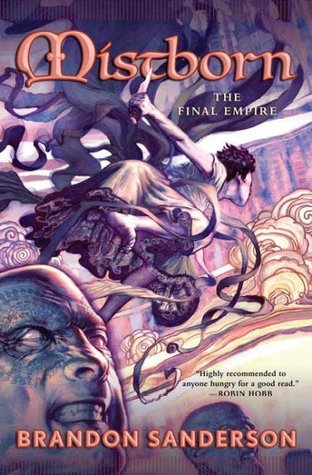 Mistborn: The Final Empire
Mistborn: The Final Empire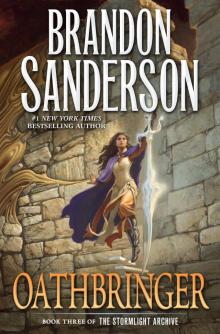 Oathbringer
Oathbringer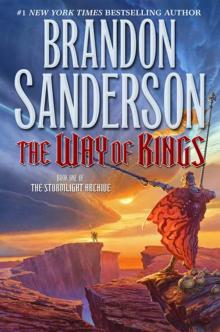 The Way of Kings
The Way of Kings Redemption
Redemption Skin Deep
Skin Deep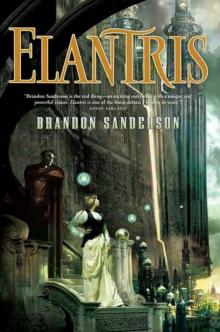 Elantris
Elantris Snapshot
Snapshot Sixth of the Dusk (Cosmere)
Sixth of the Dusk (Cosmere)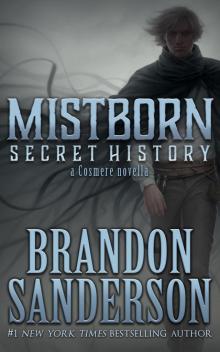 Mistborn: Secret History
Mistborn: Secret History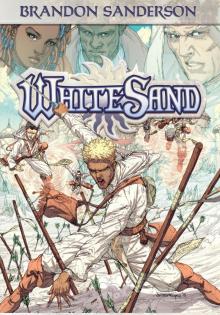 White Sand, Volume 1
White Sand, Volume 1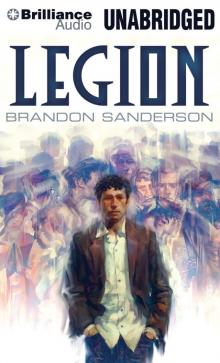 Legion
Legion The Well of Ascension
The Well of Ascension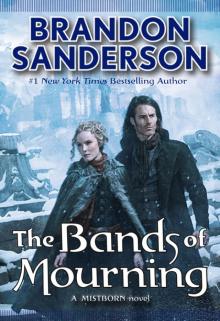 The Bands of Mourning
The Bands of Mourning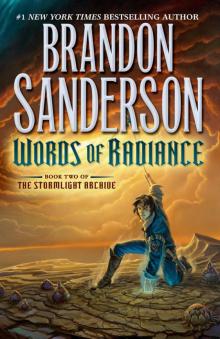 Words of Radiance
Words of Radiance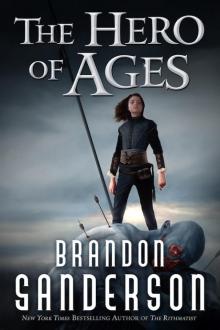 The Hero of Ages
The Hero of Ages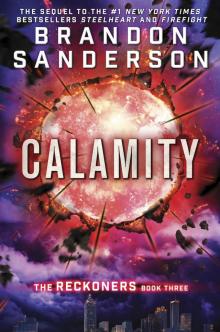 Calamity
Calamity Alcatraz Versus the Scrivener's Bones
Alcatraz Versus the Scrivener's Bones The Alloy of Law
The Alloy of Law The Emperors Soul
The Emperors Soul The Dark Talent
The Dark Talent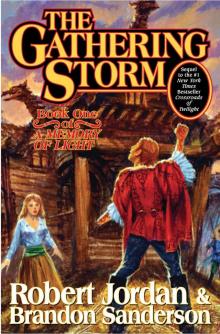 The Gathering Storm
The Gathering Storm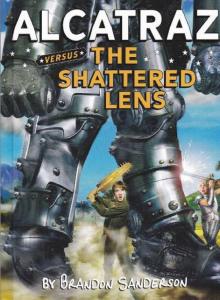 Alcatraz Versus the Shattered Lens
Alcatraz Versus the Shattered Lens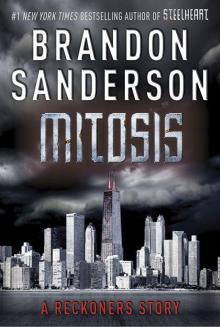 Mitosis
Mitosis Alcatraz vs. The Evil Librarians
Alcatraz vs. The Evil Librarians Rhythm of War (9781429952040)
Rhythm of War (9781429952040)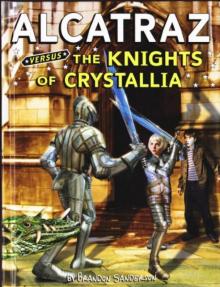 Alcatraz Versus the Knights of Crystallia
Alcatraz Versus the Knights of Crystallia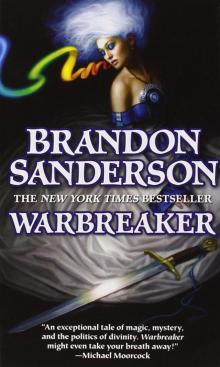 Warbreaker
Warbreaker Firstborn
Firstborn Starsight
Starsight Edgedancer
Edgedancer Perfect State
Perfect State Shadows of Self
Shadows of Self The Way of Kings Prime
The Way of Kings Prime Starsight (US)
Starsight (US) Shadows for Silence in the Forests of Hell
Shadows for Silence in the Forests of Hell Arcanum Unbounded: The Cosmere Collection
Arcanum Unbounded: The Cosmere Collection Awakening
Awakening Firefight
Firefight Dawnshard
Dawnshard Defending Elysium
Defending Elysium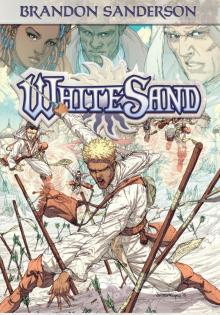 White Sand
White Sand Infinity Blade: Redemption
Infinity Blade: Redemption The Final Empire
The Final Empire Skyward
Skyward Lies of the Beholder
Lies of the Beholder Elantris e-1
Elantris e-1 Steelheart r-1
Steelheart r-1 Legion: Skin Deep
Legion: Skin Deep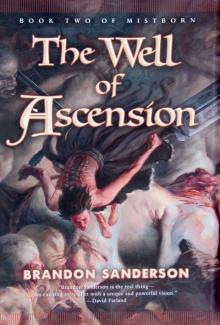 Well of Ascension
Well of Ascension Mistborn
Mistborn Alcatraz versus the Evil Librarians
Alcatraz versus the Evil Librarians The Final Empire m-1
The Final Empire m-1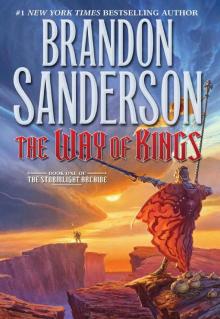 The Way of Kings (Stormlight Archive, The)
The Way of Kings (Stormlight Archive, The)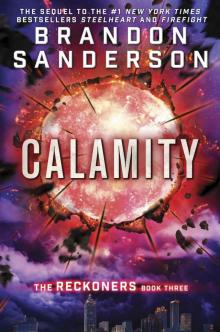 Calamity (The Reckoners)
Calamity (The Reckoners) Legion and the Emperor's Soul
Legion and the Emperor's Soul Legion: The Many Lives of Stephen Leeds
Legion: The Many Lives of Stephen Leeds The Mistborn Trilogy
The Mistborn Trilogy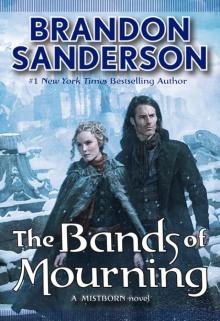 Bands of Mourning
Bands of Mourning Alcatraz
Alcatraz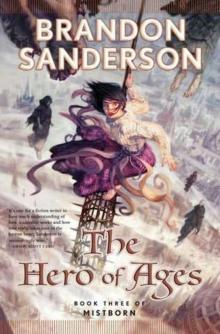 The Hero of Ages m-3
The Hero of Ages m-3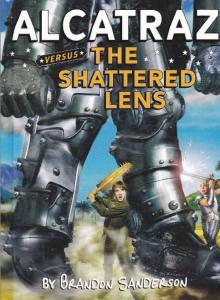 Alcatraz vs. the Shattered Lens
Alcatraz vs. the Shattered Lens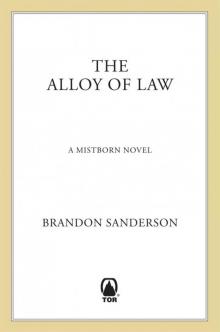 The Alloy of Law: A Mistborn Novel
The Alloy of Law: A Mistborn Novel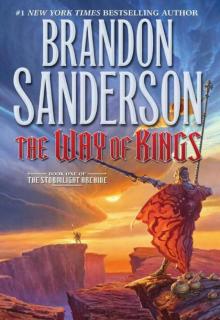 The Way of Kings sa-1
The Way of Kings sa-1 Infinity Blade: Awakening
Infinity Blade: Awakening Sixth of the Dusk
Sixth of the Dusk The Stormlight Archive
The Stormlight Archive The Aether of Night
The Aether of Night